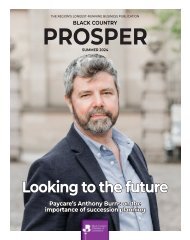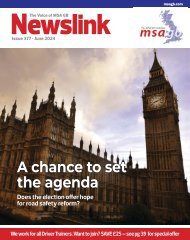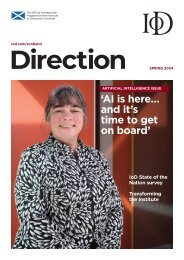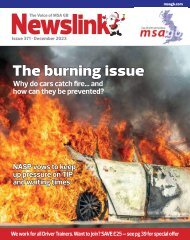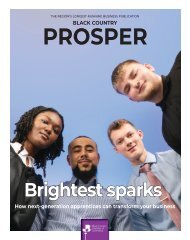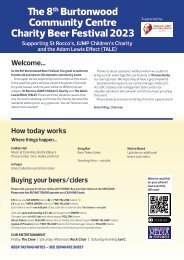IoD Scotland Autumn 2021
Institute of Directors Scotland, business magazine, directors
Institute of Directors Scotland, business magazine, directors
You also want an ePaper? Increase the reach of your titles
YUMPU automatically turns print PDFs into web optimized ePapers that Google loves.
Putting wellbeing before profit<br />
as we build a new economy<br />
The Covid-19 pandemic has shown us<br />
that when pushed, we can do impossible<br />
things – so is the climate emergency<br />
another time where we need to do the<br />
‘impossible’ again and build an entirely<br />
new economic model based on<br />
wellbeing and balance with nature?<br />
That was the question posed by<br />
Dr Katherine Trebeck, co-founder of the<br />
Wellbeing Economy Alliance, in a<br />
conference session chaired by Louise<br />
Macdonald, <strong>IoD</strong> <strong>Scotland</strong> national director.<br />
Dr Trebeck described the current<br />
economic model as “inadequate for<br />
delivering the standard of life required<br />
without depleting natural resources;” it<br />
was time for a new alignment that<br />
promoted the environment and people’s<br />
wellbeing to the same level of profit.<br />
The Wellbeing Economy Alliance’s<br />
goal was to support organisations as<br />
they challenge the hegemony and<br />
explored new methods of working.<br />
Advocates were transforming their<br />
organisations by putting their<br />
decision-making through a<br />
‘wellbeing focus’ that looked<br />
closely at products and practices<br />
and questioned their impact.<br />
Current economic models were the<br />
victims of narrow thinking that the<br />
climate crisis was forcing them to<br />
challenge, and Dr Trebeck urged<br />
delegates to build new bridges with all<br />
stakeholders to align policies for mutual<br />
benefit.<br />
In a robust Q&A session that followed<br />
delegates questioned whether the<br />
current economic model was “broken”. It<br />
wasn’t, said Dr Trebeck; it worked within<br />
its current rules. Her advice,<br />
“Do we need to reframe what<br />
success means in business?”<br />
Dr Katherine Trebeck<br />
Dr Katherine<br />
Trebeck<br />
however, was that<br />
those rules needed<br />
changing, and quickly.<br />
As she pointed out, governments<br />
spend billions on welfare payments to<br />
ensure citizens had a reasonable<br />
standard of living. Wouldn’t it be better,<br />
she asked, if the economic model<br />
ensured everyone had that expected<br />
standard of living at source, without<br />
state help – and without asking the<br />
planet to do the heavy lifting, too?<br />
She ended with some challenges to<br />
current thinking. Do we need to reframe<br />
what ‘success’ means in business, and<br />
perhaps more closely align director’s<br />
remuneration with not only profit but the<br />
company’s impact on the environment<br />
and wellbeing of its employers?<br />
The innocent approach proves that sustainable<br />
businesses can be global success stories<br />
Leading a business that takes the name<br />
‘innocent’ carries a particular weight,<br />
admitted its CEO Douglas Lamont – and<br />
with its values and philosophy front and<br />
centre, it was imperative the business<br />
‘walked the walk’ on sustainability and<br />
the environment.<br />
The drinks company is aiming to be<br />
Net Zero by 2030 – an ambitious goal,<br />
given the carbon footprint of agribusinesses.<br />
But with a new production<br />
plant in Rotterdam based on the<br />
strongest sustainability criteria possible,<br />
it was an ambition the company was<br />
determined to meet.<br />
Douglas said there were a host of<br />
opportunities awaiting those who built<br />
their businesses on the pillars of<br />
sustainability and social justice<br />
– not least the ability to attract<br />
committed, focused<br />
employees who were keen<br />
to make their own<br />
contributions to tackling<br />
the climate emergency.<br />
He was a passionate<br />
advocate of sustainable<br />
capitalism. Innocent did not<br />
get everything right, and he<br />
Douglas Lamont<br />
was happy to accept challenge from any<br />
corner over its operations.<br />
However, he also knew that he could<br />
“look himself in the mirror every night<br />
knowing his business was trying to do<br />
the right thing.”<br />
An example of this was the new<br />
Rotterdam facility. It was built from the<br />
ground up on the principles of water<br />
reduction, eliminating carbon from<br />
energy sources and streamlining<br />
processes to make it as sustainable as<br />
possible. While the construction had<br />
been costly, it would offer payback for<br />
years to come. “We’re in a new paradigm<br />
in which thinking about the environment<br />
is the new norm,” he said. “We have to<br />
balance profit with people and<br />
planet.”<br />
Be good all round, he<br />
urged. There was little<br />
point trumpeting about<br />
the 10 per cent of your<br />
organisation with<br />
positive environmental<br />
metrics when the rest<br />
was poor. “Avoid green<br />
washing and be<br />
action-orientated. It’s<br />
not just words on a sheet<br />
of paper; you need to<br />
propagate change.”<br />
His team at innocent were<br />
“evangelical” about the business’s<br />
sustainability criteria and were its<br />
greatest ambassadors.<br />
Session lead Aidan O’Caroll, Chair of<br />
<strong>IoD</strong> <strong>Scotland</strong>, asked if the company’s<br />
takeover by drinks giant Coca Cola had<br />
threatened innocent’s principles.<br />
Douglas said the takeover had reinforced<br />
its ethos: Coca Cola “bought innocent<br />
because of its environmental<br />
credentials,” and remained fully<br />
supportive “of everything we do –<br />
including our annual donation of 10 per<br />
cent of our profits to charity.”<br />
“We’re in a new paradigm<br />
in which thinking about the<br />
environment is the norm...<br />
we have to balance profit<br />
with people and planet...”<br />
Douglas Lamont<br />
<strong>Autumn</strong> <strong>2021</strong><br />
iod.com<br />
31




